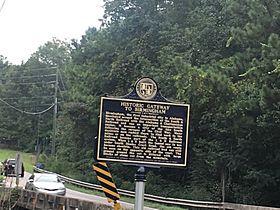Brock Gap facts for kids
Quick facts for kids Brock Gap |
|
|---|---|

Historic marker and commemorative plaque in Brock gap, Hoover, Birmingham, Alabama.
|
|
| Elevation | 518 feet (158 m) |
| Location | Jefferson County, Alabama, U.S. |
| Range | Cahaba Ridges |
| Coordinates | 33°20′12″N 86°52′15″W / 33.33667°N 86.87083°W |
| Topo map | USGS Helena |
Brock Gap (sometimes called Brock’s Gap) is a natural opening or pass through Shades Mountain in Hoover, Alabama. It became very important in the late 1800s. A railroad called the South & North Railroad (S&N) used this gap to connect the city of Birmingham with valuable natural resources like coal and iron ore found south of the mountain. This connection helped the area grow and develop quickly.
Where is Brock Gap?
Brock Gap is about 518 feet (158 meters) above sea level. The mountains around it, like Shades Mountain, are much taller, often over 700 feet high. So, the gap is like a lower pathway through the higher land.
Building the Railroad Through Brock Gap
In 1858, a man named John Milner was asked by the State of Alabama to find a way for the S&N Railroad to cross Shades Mountain. The S&N Railroad wanted to connect important natural resources, like coal, limestone, and iron ore, from the south. These resources were needed for new factories and businesses in the area that would become Birmingham.
Brock Gap was chosen as the best spot. Workers built the railroad line north between 1858 and 1871. Construction was paused during the Civil War. To make the path wide enough at Brock Gap, workers used a powerful explosive called nitroglycerin. They blasted a deep cut, about 75 feet deep, right through the hard limestone rock.
How Railroads Use Brock Gap Today
The deep cut made in the 1800s is still used by trains today. The CSX Lineville Subdivision uses this path as part of its route. This line connects Birmingham to cities like Atlanta, Georgia and places in Florida.
Another part of the original S&N Railroad, now called the CSX S&NA South Subdivision, also uses Brock Gap. However, this line goes through a newer tunnel. This tunnel was built a little to the east of the old 19th-century cut.
 | Kyle Baker |
 | Joseph Yoakum |
 | Laura Wheeler Waring |
 | Henry Ossawa Tanner |

